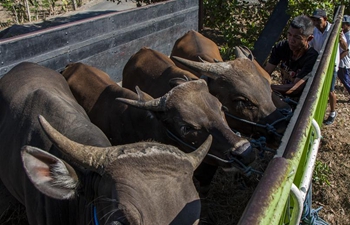JUBA, Sept. 28 (Xinhua) -- South Sudan on Thursday pledged to enhance vaccination and strengthen animal health regulations to curb the spread of rabies among the ballooning population of stray dogs.
James Janga Duku, Minister of Animal Resources and Fisheries, said mass displacement of people coupled by the ongoing economic crisis in the war-torn country has forced many families to abandon their pets, resulting in a big colony of strays and a rise in rabies cases.
Speaking at an event to mark the World Rabies Day, Duku said the East African country has seen an increase in reported cases since the country started recording suspected rabies cases in 2007.
"The current economic situation has made human beings compete for the same food with dogs and dogs become sacrificed, and as a result they go and roam in the streets," he said.
The minister said the government "shall decide what to do" with these stray dogs that he said have become a menace to the public.
"We are going to conduct proper surveillance and monitoring among the dogs whether they are astray or domestic. We need to move with a nationwide vaccination program outbreak of rabies among the dogs," Duku said.
Duke further said his ministry has teamed up with partners such as the UN Food and Agriculture Organization (FAO) and several local and international aid agencies to enhance awareness among communities on dog healthcare and public health risks associated with dogs.
Ghada James Killa, President of the South Sudan Veterinary Association, said they have recorded five deaths related to rabies this year alone, adding that the cases could be even higher as many communities in rural areas do not seek medical attention after being attacked by animals.
"Dogs have become a threat in our communities because they move in groups and they attack children and women. So we must increase our research to combat the outbreak of rabies in the country," Killa said.
Martin Barasa, country director of the animal health charity Veterinary Sans Frontiers (VSF), said though there are no statistics on the population of dogs in South Sudan, they have received overwhelming requests from communities and health workers demanding response and development of strategies to reduce the growing number of uncontrolled dog population.
"There is a huge problem emerging in the country especially in camps for displaced people that dogs population have increased, they are very aggressive and biting people especially children and women. So we need to develop a strategy to tackle this emerging threat," Barasa said.
According to the World Health Organization (WHO), rabies is a viral disease mostly transmitted to humans through bites, scratches or other contact with saliva of an infected animal such as dogs.
It is estimated that rabies accounted for over 17,000 deaths in 2015, with 90 percent of fatalities in Africa and Asia.
If it goes untreated in unvaccinated humans, it becomes fatal after neurological signs and symptoms have developed, but treatment after exposure is highly successful in preventing the disease.
Nimaya Mogga, FAO Livestock Officer in South Sudan, said initial assessments have shown that many people in South Sudan do not know what rabies is or live in remote locations without adequate and well-equipped health facilities to deal with dog bites.
He said FAO would support the government of South Sudan to strengthen its capacity to minimize the risk of transmission of rabies in human populations.

















